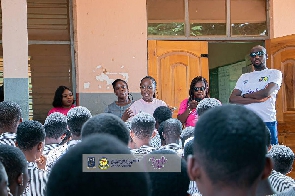For half of the world’s population, menstruation is a natural and normal process. For many women, however, it is a source of prejudice, stigma, and discrimination.
Menstrual poverty is a significant issue in Ghana, with many girls and women lacking adequate access to menstrual hygiene products and education. This has a significant effect on their health, education and overall well-being.
According to the United Nation Educational, Scientific and Cultural Organisation (UNESCO), one in ten girls in Sub-Saharan Africa miss school during their
menstrual period.
In Ghana where there has been a significant increase in the cost of disposable sanitary products, girls and women resort to the use of rags during ‘that’ time of the month. Apart from the use of rags in place of sanitary towels which poses health challenges, the issue of school girls missing classes during that ‘time’ of the month is a significant problem.
It is critical to promote period hygiene and give access to menstruation products and services, particularly in underprivileged communities
In celebrating World Menstrual Hygiene Day, the Women’s Commission of the University of Ghana Graduate Student’s Association organized a two-day outreach and sanitary kit distribution project themed “Cycle Care” on the 29th and 30th on May.
The following schools benefited from this initiative University Staff Village Basic School, Royal Child School, Madina Number 1 & 4 Primary, and Madina Number 1, 2 and 3 Junior High School.
This initiative was to increase awareness about Menstrual hygiene management and the importance of using safe and clean Menstrual products among school girls.
The outreach was set to help address the issue of period poverty by providing these girls with free sanitary pads to enable them to manage their periods hygienically.
The Commision used this opportunity to appeal to government to consider the plight of vulnerable girls and young women and abolish taxes imposed on sanitary products.

This is because the use of sanitary products is a necessity and not a luxury.
The high cost of sanitary pads places additional economic burden on women and girls.
It is important to recognize that menstruation is not by choice.
It is stated clearly in our constitution that access to free universal basic education is a fundamental human right, however, menstrual poverty remains a significant impediment to access education for girls and young women as many of them miss school during menstruation simply due to their inability to afford sanitary products. This is clearly unacceptable.
Abolishing the numerous taxes on sanitary products will make them affordable to girls and women and will keep them in school.
The Commission called on all well-meaning Ghanaians to support this call.
They also used this opportunity to acknowledge the following for supporting this initiative, the Dean of Students Prof. Rosina Kyeremanteng, Hon. Lydia Seyram Alhassan, Mrs. Mary Annane Awuku, Prosper Hoetu Esq, Mr. Justice Agbezuge, Phil’s Group, the Executive Council of Grasag-Legon, the Women’s Commission Committee, Jibu water, African Centre for Women in Politics and all individuals who made this outreach successful.
General News of Wednesday, 31 May 2023
Source: Evans Obiri, Contributor

















